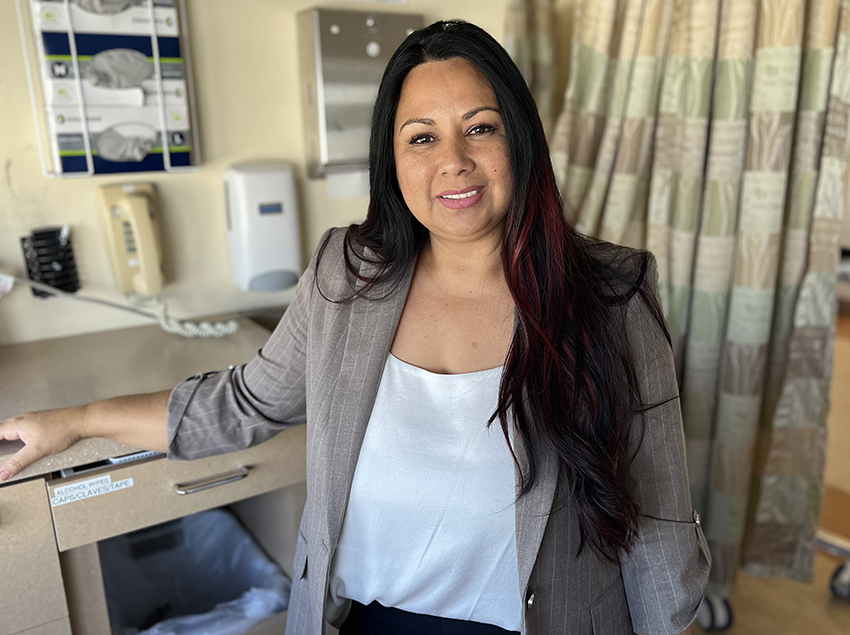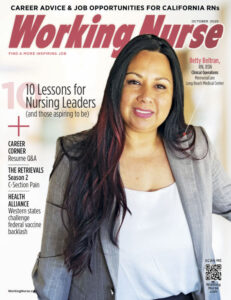Feature
Nurses Grieving Patients
Healthy ways to manage the deep emotions that accompany loss

An Anguished Foster Mom
One day, I was the resource nurse for the PICU where I work, helping other nurses who were especially busy and providing break relief. One of my colleagues, Sarah, was the bedside nurse for a 2-year-old boy who had tragically drowned at his own birthday party.
I sent Sarah on break just after our physicians confirmed that the boy no longer had any meaningful brain activity.
His foster mother was at the bedside, completely beside herself with anguish as she cried, “No, no, no, no, no! Wake up, buddy, we were supposed to have a future together!”
As she wept, my own emotions surged, and it required great effort for me to keep myself from bursting with tears. I went home heavy-hearted, and found myself frequently thinking about the case for the next few weeks.
This experience led me to contemplate the role of nurses in the grieving of our patients and their families. While the story of loss and grief is not primarily about us, neither does the story totally exclude us.
We are the most consistent healthcare presence at our patients’ bedside, developing deep-rooted connections, and although our role in patients’ lives is limited, our grief for them is no less valid.
Balancing Professionalism With our Humanity
The reality of healthcare is that nurses often have to move on quickly after emotionally difficult scenarios. The fast pace of our work typically does not allow for a lot of self-care or processing of grief. Healthcare culture often presents stoicism as a standard of professionalism and a sign of strength.
However, grief is a normal and appropriate response to losing someone we care about. We shouldn’t try to squelch or deny our sadness under the guise of “staying strong.” Acknowledging and processing grief is an act of courage and strength, not weakness.
While controlling our emotions at work is certainly important, we also need to be careful not to suppress our emotions over and over again. Healthy grieving, including articulating our thoughts and feelings, is an important practice we all need to learn.
Healthy Ways to Process Grief
Honor your own experience.
Pay attention to how and when you experience grief. For example, do you feel waves of strong emotions (e.g., extra sensitivity, impatience, or anger) a certain amount of time after losing a patient, perhaps later that day or a week later?
When I have an emotionally heavy case, I know that I will experience a strong wave of feeling the following day. So, the next day, I try to stay in quieter, more private spaces whenever possible so that the emotion can work its way through me. This is how I honor my own humanity as a nurse.
Turn to others.
Look for debriefing groups offered within your unit/hospital. There, you can process thoughts and emotions with others who are familiar with the cases and best understand this kind of secondary grief.
If debriefing groups are not available, seek out trusted colleagues with whom you can discuss your feelings honestly and openly. Seeking a counselor (whether a professional therapist, a trusted spiritual leader, or a mentor) to help you sort through your experiences can also be helpful.
Find healing in goodness.
Spend time in a place of natural beauty, be it a beach, a public garden, or some other setting where you can be reminded that goodness and wonder are still very present in our world.
If you need to direct your grief into action and energy, look for ways you can participate in expressions of justice and mutual support, whether it’s walking dogs at a local animal shelter or volunteering at a soup kitchen.
By creating appropriate outlets for our emotional reactions, we can be steady for our patients while still allowing ourselves the space to be moved by them.
Addressing Specific Scenarios
The way we grieve may depend on our relationship with the patient and their family. Here are some ways to approach various different situations.
When speaking with a patient’s loved ones in an end-of-life case:
While you should not make yourself the main focus of emotional need, you can certainly express your feelings of sadness. For example, you can say something like:
It has been an honor for me to take care of [your loved one]. Thank you for trusting me with his/her care. I wish things could be different for you all.
You can also verbalize how certain attributes of the patient and family moved you. For example, you might say:
I loved how [patient’s name] always found a way to show so much kindness to us even when he wasn’t feeling well, and I’ll always remember the gentle ways in which you all interacted and cared for each other. My heart breaks with you, and I’m so sorry.
These connections with the patient’s family go a long way in honoring the humanity of every person in the room, including us nurses.
When you’re close to a patient:
Consider memorializing your patient so that their story and your emotions don’t remain bottled up inside of you.
Memorializing might include journaling; taking a photograph that you feel encapsulates the personality of, or your experience with, that patient; and/or writing a letter to the patient or family (which you don’t have to send).
If you don’t know where to start, try free-writing (without self-editing or worrying about quality of writing) based on a prompt like:
The story of [patient’s name] moved me because …
When you didn’t know the patient:
Sometimes, you may feel deep grief and/or distress about a death even if you did not know or were not particularly close to the patient and family.
In some cases, simply being in proximity to coworkers who are feeling the emotional toll may stir up sensitive emotions, even if you had no connection to the patient.
 Our PICU recently admitted a number of very young car accident victims from a severe multi-car pile-up caused by a reckless driver. Many of these children had life-altering injuries that would leave them permanently disabled. Some had lost parents or siblings in the same accident. Patients and family members were often lost and overwhelmed.
Our PICU recently admitted a number of very young car accident victims from a severe multi-car pile-up caused by a reckless driver. Many of these children had life-altering injuries that would leave them permanently disabled. Some had lost parents or siblings in the same accident. Patients and family members were often lost and overwhelmed.
This tragedy took a toll even on those of us who didn’t work on these cases directly. We all felt a deep heaviness as we tried to process the devastation and injustice. During that time, the staff leaned heavily on one another to cope.
Emotional Aftercare
All these practices are ways for us to engage in emotional aftercare following heavy patient cases. Confronting the pain of grief can be difficult, but like cardiac surgery, our efforts ultimately help us address what may be “clogged up” inside our own hearts.
HUI-WEN SATO, RN, MSN, has worked as a pediatric ICU nurse in Los Angeles since 2010. She is a featured conference speaker, writer, and podcast guest. In 2017, she gave a TEDx Talk entitled “How Grief Helped Me Become a Better Caregiver.”
In this Article: End-of-Life Issues, Pediatrics






